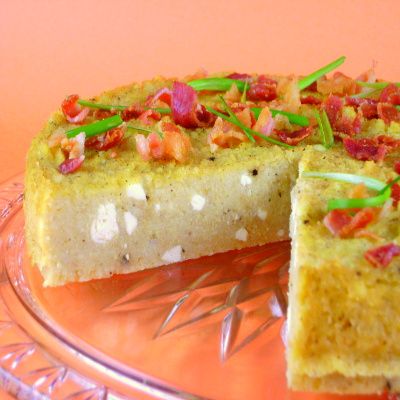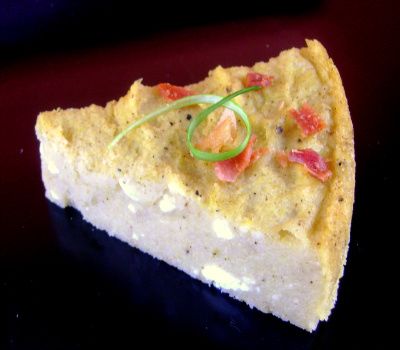

From the kitchen of One Perfect Bite...Mămăligă (pronounced mer mer li ger) is a polenta that many call the national dish of Romania. While once thought to be peasant food, it has slowly made its way to homes and the tables of upscale restaurants around the world. Romanian's combine cornmeal with butter and cheese to produce a unique polenta that is wonderful with eggs, cheese, mushrooms or the soured cream they call smântană. I learned how to make it several years ago while at a cooking competition in New York City. The event was held at the Institute of Culinary Education and because we had to prepare our entry 5 times, each contestant was assigned an assistant to help with the work. The rules were a bit out of the ordinary in that we had to make the first of the entries by ourselves but the remainder could be completed with the help of the assistant. I was really fortunate. My assistant, who really knew her stuff, was from Romania and we got along famously. Towards the end of a long but lovely morning, I asked about the food of Romania and that's how I came to learn of mămăligă. I suspect that you'll have a problem finding kashkaval cheese, but provolone or mozzarella can be substituted. If you're looking for something that's different but delicious, give this a try. Preparation is simple but the baked mămăligă should sit for several hours before serving.
Mamaliga Baked with Cheese...from the kitchen of One Perfect Bite
Ingredients:
1 cup + 2 tablespoons coarse ground cornmeal
4 cups water
1/4 cup butter
1-1/2 cups crumbled feta cheese
1/2 cup kashkaval or provolone, grated
Salt and freshly ground black pepper
Garnish:
Bacon and scallions, sliced lengthwise
Directions:
1) Preheat oven to 375 degrees F. Grease a 9-inch springform pan. Set aside.
2) Place cornmeal in a large, heavy skillet and dry-fry over medium heat until it changes color, about 3 to 4 minutes. Remove from heat. Slowly add water, stirring constantly to combine. Add a pinch of salt. Return to heat. Continue to stir until cornmeal begins to thicken. Cover, reduce heat and cook for 25 minutes, stirring often. When a spoon leaves a trail in the mixture it is done. Remove from heat. Stir in butter and feta cheese. Season well with salt and pepper.
3) Spoon mixture into prepared pan. Bake until firm, about 25 to 30 minutes. Cool. Let sit for 2 to 3 hours, or overnight. Sprinkle with provolone, bacon and scallions. Serve with a mushroom ragu, sour cream or a chunky tomato sauce. Yield: 6 servings.

35 comments :
Mary,
You always have GREAT!!! recipes and so DIFFERENT!!!
I love the combination of cheeses in this recipe.
Geri
This sounds so good -it's nice to have something different from another country to try.
vickie
This looks sooo good! Would be a great side dish!
I've never heard of this before - it looks really interesting and delicious.
wow che spettacolo! complimenti!
I've been kind of getting my polenta "legs" on and think i can try this. It looks beautiful and has a wonderful story to go along with it.
wow! this looks SO PRETTY. from far off i thought it was a confetti birthday cake! haha. It looks nice enough to be one. Very cool though, i never heard of anything like this before!
Une recette originale que je ne connaissais pas, c'est super de nous faire partager de telles recettes
I don't know if I can pronounce this dish but it sure does look yummy.
Have a wonderful weekend.
Blessings,
Heidi
Interesting and unique dish! I'm going to more search on it. Thanks!
Gosh, I spent a couple of week's in Romania in the 80's. It was an eye-opening experience to so many unique dishes and flavors. I don't think I was introduced to this, but it sounds easy to make-- and very unique. I love polenta, and this could be something fun to experience.
Now this truly would be an interesting dish to try. I have never heard of it before and that I find very intriguing. How fun that must have been to be in the competition!
This is totally new to me - but anything with that much cheese has to be good!
What a unique and wonderful recipe! It sounds delicious, Mary. Thank you.
I haven't had polenta in years but it was a staple of my father's family. My paternal grandparents came from a small northern Italian village which is one of only a few places in Italy where polenta was made as a regular dinner dish. (My grandmother also made her own cheese, sausage, and wine!) Love this recipe of yours!!! Thanks so much for sharing! Have a beautiful weekend! Coralie
That's it. You are a super human Mary. I don't even HAVE a Romanian friend to show me these things. This is too neat!!
Laura
I love this recipe, and I love polenta, and if you don't include wheat flour this is a great recipe for coeliacs.
This is something I don't have a chance to try. Something made of cornmeal or polenta! It looks like Chinese steamed yam cake though.
Sophie- This Romanian style polenta looks absolutely delicious. I did not know that Romanians enjoyed this style of dish. I learned something this evening. Thanks for sharing.
WOW, how different and interesting!
love the blog.
thanks for visiting mine!
Marti @ forkingit.blogspot.com
Hello Mary I am still laughing at your comment. If God was going to get me, it should have happened long ago. Ha.
You won't believe this but I am going to make this recipe. It has everything I love in it. The cheese will have to be an alternative but I can do this. I'll let you know how we like it.
Have a great weekend.
Hugs, Jeanne
What a food artist you are!! You are a gifted chef!
Thanks for stopping by and leaving a comment on my blog. Our grandson was enjoying a sunny fall day and a visit to the goldfish pond. We have had alot of rain so it was so refreshing to get outside and feel the sun. He totally loved it-like you said, mud and water draw little boys like molasses draws flies!!
Drop by again. Blessings.
Sounds good to me, Mary!
I am impressed with your diacritical marks!
Have a good weekend..
Thank you for your kind note on my blog.
Wow! I haven't heard that word 'mamaliga' since I was a child, the recipe looks good and I've never had it before.
Thanks for sharing.....
That has to be one of the most colorful dishes I've seen in a long time...not to mention have ever even heard of!! How intrigueing.
Such a unique dish and it looks great too. I love to try new foods from different cultures/countries.
This is really different. You always have an interesting story to tell.
This is definitely a new one for me. I have been hankering for polenta lately and this is such a fun twist. Thank you. It looks delicious.
This is fascinating, Mary. I have a good friend who is a scholar of Eastern European culture - I will ask him about this.
What an interesting recipe... leave it to you, Mary to come up with great things like this! It sounds like it would really be good with a chunky tomato sauce.
Love the colours! I've never had polenta this way, sounds really good!
I love how you post your recipes together in the way that you love to eat them - mamaliga with wild mushroom ragu (below)! Actually this dish reminds me of a Chinese yam cake dish that's eaten for breakfast where I live (http://en.wikipedia.org/wiki/Taro_cake). Thanks for sharing!
I love how you post your recipes in a way that teaches us how to make two dishes that you love to eat together - mamaliga with wild mushroom ragu (below)! This dish kinda reminds me of a Chinese yam cake dish that's eaten for breakfast where I live, except it's with cheese. Thanks for sharing!
Mary, this is a fantastic dish! One of those easy-to-make peasant dishes that are a marvel! Beautiful! One recipe is better than the next at your house.
Traditionally, mămăliga is cooked by boiling water, salt and cornmeal in a special-shaped cast iron pot called ceaun or tuci. When cooked peasant-style and used as a bread substitute, mămăliga is supposed to be much thicker than the regular Italian polenta to the point that it can be cut in slices, like bread. When cooked for other purposes, mămăliga can be much softer, sometimes almost to the consistency of porridge. Because mămăliga sticks to metal surfaces, it can be cut with a string into slices, and is eaten by holding it with the hand, just like bread would be.
Post a Comment